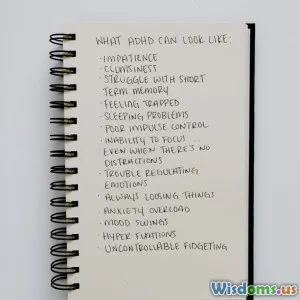
The Role of Self Reflection in Personal Growth
7 min read Explore how self-reflection fuels personal growth, empowering emotional intelligence and mindful transformation. (0 Reviews)
The Role of Self Reflection in Personal Growth
Introduction
Have you ever paused amid your busy day to ask yourself, "Why did I react that way?" or "What can I learn from this experience?" This simple act, often overlooked, is the cornerstone of profound personal transformation: self-reflection. In a world filled with distractions and rapid change, self-reflection allows us to hit the pause button, dive deeper into our inner world, and cultivate lasting growth. This article explores how self-reflection acts as a driving force in psychology and personal development, providing actionable insights and real-world examples to help you unlock your full potential.
What Is Self-Reflection?
Self-reflection refers to the conscious process of examining one’s thoughts, emotions, behaviors, and decisions. Unlike casual pondering, it involves intentional introspection to gain clarity and insight. Psychologist Donald Schön, renowned for his work on reflective practice, described it as thinking "about our thinking" with the aim to improve our understanding and adaptability.
Consider it a mental mirror—a tool that reveals not only your strengths but also areas needing growth. It’s foundational in cognitive-behavioral therapies where awareness of maladaptive thoughts leads to meaningful change.
The Psychological Mechanisms Behind Self-Reflection
At its core, self-reflection engages several cognitive and emotional processes:
- Metacognition: Thinking about your own thinking processes to regulate them better.
- Emotional Regulation: Understanding emotional triggers to respond rather than react impulsively.
- Learned Optimism: Seeing setbacks through a lens that fosters resilience.
Neuroscientific studies indicate regions such as the prefrontal cortex activate during reflective thought, facilitating planning and self-control. For example, a 2018 study published in Social Cognitive and Affective Neuroscience showed individuals engaging in self-reflective thought exhibited increased neural connectivity in areas related to emotional regulation.
Why Is Self-Reflection Crucial for Personal Growth?
1. Enhancing Self-Awareness
Self-reflection is the most direct route to knowing yourself deeply. It helps uncover unconscious patterns that shape decisions and relationships. Take someone struggling with procrastination; reflecting on their habits and underlying fears may reveal a fear of failure rather than laziness. This subtle insight becomes a springboard for targeted change.
2. Improving Emotional Intelligence
Daniel Goleman, a pioneer in emotional intelligence, highlights self-awareness as a core component. Reflection enables individuals to identify their emotions, understand their origins, and manage responses thoughtfully. This skill improves workplace interactions, leadership effectiveness, and personal relationships.
3. Facilitating Accountability and Responsibility
Turning the reflective gaze inwards promotes ownership of actions. Instead of blaming external factors, reflective individuals evaluate their role in outcomes, cultivating a mindset geared toward growth rather than victimhood.
4. Stimulating Continuous Learning and Adaptation
In fast-evolving environments, static mindsets are liabilities. Self-reflection encourages a dynamic self that questions existing beliefs and adapts accordingly. Entrepreneurs, for instance, use reflective journaling to assess failures and innovate.
Techniques to Cultivate Effective Self-Reflection
Reflective Journaling
Writing acts as a cognitive tool to structure and externalize thoughts. A study in the Journal of Educational Psychology found students who maintained reflection journals improved problem-solving skills and self-regulation.
Example: End each day by noting one challenge, your response, and possible alternatives.
Mindfulness Meditation
Mindfulness trains attention to present experiences without judgment. This heightened awareness facilitates honest reflection on one’s thoughts and emotional states. Research published in Mindfulness (2017) concluded that mindfulness practice increases reflective awareness and reduces automatic negative judgments.
Seeking Feedback
While self-reflection is internal, external perspectives enrich the process. Constructive feedback provides different angles to consider, preventing distorted self-assessments.
Real-World Insights: Self-Reflection in Action
-
Nelson Mandela practiced reflection throughout his imprisonment, famously stating, "I have walked that long road to freedom. I have tried not to falter; I have made missteps along the way." This reflective mindset fueled his resilience and transformative leadership.
-
In corporate settings, companies like Google encourage "post-mortem" meetings where teams analyze successes and failures transparently, promoting collective self-reflection and innovation.
Common Pitfalls and How to Avoid Them
Overthinking Leading to Rumination
Reflection differs from rumination, which is repetitive and negative dwelling. To avoid trap:
- Set time limits for reflection.
- Focus on solutions rather than problems.
Lack of Action
Reflection without subsequent change is futile. Commit to at least one actionable insight after reflection.
Ignoring Emotional Responses
Sometimes discomfort arises during reflection. Rather than suppress it, acknowledge and explore these emotions for meaningful breakthroughs.
Conclusion
Self-reflection is not merely a mental exercise but a transformative journey enabling individuals to understand themselves more deeply and make conscious choices toward growth. In an era that prizes speed and multitasking, slowing down to reflect can profoundly enhance emotional intelligence, resilience, and personal fulfillment.
By integrating proven reflective practices such as journaling, mindfulness, and embracing feedback, anyone can harness self-reflection’s power. As the Greek philosopher Socrates wisely said, "An unexamined life is not worth living." Embark on the path of self-reflection today—your future self will thank you.
Rate the Post
User Reviews
Popular Posts





















